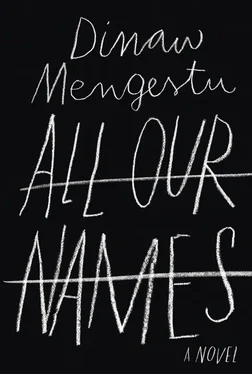He turned on the ignition, adjusted the rear and side mirrors, and slowly reversed out of the space. I knew that I had been lied to, but I couldn’t help smiling. Whatever he was playing at, it was a wonderful performance. I had to admit that.
I left the hospital on a Sunday, and Isaac was there waiting for me. He had thrown what few belongings I had into a pair of grain sacks and was standing in the parking lot with them, and that was how I knew I was also homeless. The other patients in the hospital were fed and had their wounds dressed and cleaned by their family. Mothers, wives, and children brought lunch, dinner, and extra gauze to change the bandages, while a few other men, who, like myself, had no one to tend to them, looked on in longing. I had learned from watching those patients that even if I did have a place to sleep it was hardly a home, and after Isaac’s visit, I was confident that when I left I wouldn’t have that. If Isaac knew I had been beaten, then everyone who lived in our corner of the city did as well, and there was no explanation in the world that could convince a group of people already in fear that a broken and beaten stranger like myself wouldn’t bring more trouble into their lives. My landlord, Thomas, was a kind, generous man even with his bad habits and many flaws, and he had taken me in though no one knew me. Had he let me return, I knew it wouldn’t have been for more than a few days.
As I walked toward Isaac, I felt nothing for the tiny room that had been lost. I moved slowly, one strained step at a time, and as I did so I thought of my mother and father and all my younger siblings, who were growing into strangers. After countless nights of deliberately trying not to think of them, I now felt a distant and detached affection that I knew I could carry harmlessly. They were gone, and whether I would ever see them again no longer troubled me. My world was weightless, more so than I had ever thought it could be. I owned practically nothing and was obligated to no one; I felt more alive than I ever had before.
Isaac and I met on the edge of the parking lot. There were cripples and beggars, each limited to a few square feet of space they must have staked out long in advance, given how meager and yet precious that ground was; in the center were a handful of wasted old men who looked as if they had chosen that spot to die. In a few weeks there would be dozens more like them, except they wouldn’t be old. They would be as young as Isaac and I were, and they’d be struggling to hold on to what little life they had left, but there would be no one to save them: the hospital by then would be full of men, women, and boys just as wounded and desperate not to die.
One of those crippled men reached Isaac the same time I did. He carried himself on a single wooden crutch, as weathered and thin as the deformed leg he dragged behind him. He spoke to Isaac in Kiswahili. Before he could extend his hand, Isaac pulled from his pocket a bundle of bills that looked as if they had been printed that day and handed him one from the middle. The man tried to prostrate himself before Isaac, but Isaac grabbed him by the elbow just as he was trying to bend his one good leg and in English said to him, “Please don’t, Grandfather,” with a tenderness rarely heard from men of any age. Before I left the hospital, one of the nuns had come to my bed to thank me for money that had been given in my name. “We don’t ask our patients to pay for their care,” she said, “since most are too poor to do so, but we’re always grateful to those who can.” She said she and the other nuns would pray for me, and as a sign of their gratitude she pressed into my palm a white plastic rosary. I hadn’t known what to do with it, but I felt ashamed, and so I quickly put it in my pocket, where it would have remained for days, until the shame had passed and I could throw it away. Now I took it out and handed it to Isaac. He was far from being a saint, but there was more decency and kindness in him than I had assumed, traits that both of us were learning to suppress.
He held the rosary up with one finger.
“What am I supposed to do with this?”
“A nurse gave it to me to say thank you.”
He folded the beads into his pocket. “I’m not the one they should thank,” he said. He took a few steps back from me.
“You look good. I’m going to call you Ali from now on.”
“I’ve been exercising.”
“How do you feel?”
“Now that you’re here, okay. I was afraid I was going to have to walk home alone.”
“You’re out of a home,” he said.
“I can see. Did he say why? Does he know I haven’t done anything?”
“I thought you knew by now that doesn’t matter. The prisons are full of people who say the same thing: I’m innocent, I have done nothing, I was just on my way to work. It’s stupid to talk like that. You know what your landlord told me when I came looking for you?”
“That I’m not much of a fighter.”
“Everyone knew that already. He said that you’re in trouble with the government. That you came here to cause trouble. When I went back and said you were in the hospital, I don’t think he believed me. I went there to bring you some clothes, and he gave me these bags.”
“Did you pack them?”
“He never gave me the chance. He wouldn’t let me inside. He said he was sorry. He has enough problems and his family to think about.”
“And what did you say?”
“I told him if he wanted to protect his family he should turn himself in to the police right now. ‘Why should I go to prison?’ he said. ‘It’s you who are causing all these problems.’ ”
“And?”
“Nothing. He was angry. He wanted to hit me. He was scared; he knew I was right. That was the best thing I could do for him. Maybe he’ll be smart now and hide a little money where only his wife can find it. Or he’ll see what’s happening and he’ll pack up his family in the middle of the night and return to his village.”
Isaac picked up my bags and began walking toward the road.
“I have nowhere to go,” I said.
I remember thinking I had expressed a rare honesty in that statement, but that was hardly the case. With Isaac near me, I may not have known where I was going, but there was always a destination waiting.
“Don’t worry,” he said. “I have everything taken care of.”
I had never seen the capital from the inside of a car. Like most, I made my way by foot or, on occasion, an overcrowded bus that stretched the limits of how close you could stand to someone before feeling violated. The small blue-shelled, white-roofed taxis, even the most dilapidated ones, belonged only to the rich and to the white. The taxis stood in long lines outside of the capital’s two largest hotels, day and night; for the drivers, all it took was a couple of good fares to make the hours of waiting worthwhile. If I did have the money for a ride, what driver, seeing me on the side of the road, would have believed I could afford it? I came from the wrong caste, and money alone couldn’t buy my way out of it. Once we reached the road, Isaac raised his hand, and a taxi parked outside a café a block away came directly to us. I looked to Isaac for an explanation, but then I understood. I saw what the cabdriver saw — a young, confident man whose clothes and spotless shoes were the telltale signs of at least moderate wealth.
We drove for maybe two, three hundred feet, lurching and stopping the whole way. That was all it took — three blocks — before I knew I was finally seeing the city as I had always imagined it, both from afar and while living there. I had imagined crowds composed of men in suits and women in blue and purple dresses, and here they were, along with the traffic cop in white gloves I added from time to time. Of course, I had seen them all before — I had stood on at least two occasions at the very same intersection we were idling in — but until that moment I had never understood that I was living the fantasy I had built out of books and radio shows. I was too busy being a character to see that.
Читать дальше












